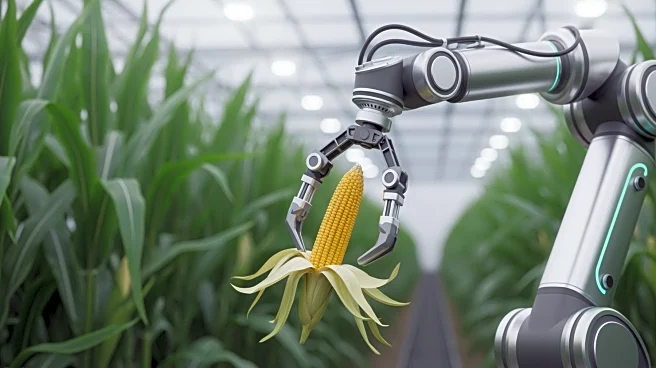What's Happening?
CNH is hosting its 2025 Tech Day at Agritechnica, unveiling a range of advanced technologies aimed at enhancing agricultural productivity. The company is focusing on AI, autonomy, robotics, and automation
to create a connected ecosystem that supports farmers throughout the crop cycle. Key innovations include Prescription Tillage, Autonomous Tillage, Planter Automation, and Sense and Act Spraying Portfolio, all designed to improve efficiency, reduce costs, and increase yields. CNH's strategy aims to nearly double Precision Tech sales by 2030, emphasizing sustainable farming practices and soil health.
Why It's Important?
The introduction of these technologies is significant for the agricultural sector, as they promise to address challenges such as soil erosion, residue management, and efficient resource use. By leveraging AI and automation, CNH aims to help farmers increase productivity while conserving resources, which is crucial given the limited arable land and degraded soils globally. These innovations could lead to higher yields and cost savings, supporting the agricultural industry's growth and sustainability. The focus on connectivity and integration with third-party services further enhances the potential for widespread adoption and impact.
What's Next?
CNH plans to continue developing its technology portfolio, with future releases such as Passive Implement Guidance and Next-Generation Planters expected to launch by 2030. The company is also working on expanding connectivity in rural areas through partnerships like its agreement with Starlink. These efforts aim to ensure farmers have access to real-time data and support, facilitating the adoption of advanced farming techniques. As CNH progresses, it will likely face challenges related to technology integration and market acceptance, but its commitment to innovation positions it well for future growth.
Beyond the Headlines
The broader implications of CNH's innovations include potential shifts in farming practices and rural economies. By reducing labor needs and maximizing efficiency, these technologies could alter the agricultural workforce landscape, requiring new skills and training. Additionally, the focus on sustainability and resource conservation aligns with global environmental goals, potentially influencing policy and investment in the sector. As CNH's technologies gain traction, they may drive further advancements in precision agriculture and smart farming, contributing to a more resilient and sustainable food system.









